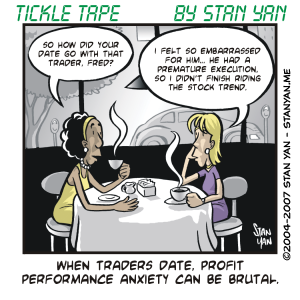Throughout our lives, we are told to foster a competitive spirit. We compare ourselves to others, inspire ourselves to do better, and try to beat out our peers. As children playing sports, we are advised to hone our skills and become a star player. In school, we are warned that higher grades are the key to long-term success. And when we enter the working world, we learn that survival depends on beating out our competition. But when it comes to trading, you aren’t actually competing with anyone but yourself. When it comes to trading, cultivating a competitive spirit can actually do more harm than good.
Comparing our performance with others does seem to have some advantages. Knowing that a goal is attainable is often a powerful motivator, for example. Several scientific discoveries were slow to materialize because they were thought impossible at first. But once the goals were deemed feasible through comparisons to others in the scientific community, progress was accelerated. But comparisons can also have adverse influences. Ironically, people who achieve great things usually work independently and could NOT care less about how others are doing. They follow their own timeline, follow their own passion, and look inward for where to go next. Trading is a similar creative process. You are the one who needs to hone your trading skills.
You are the one who must find a method that matches your aptitudes and personality. Comparisons to other traders can often prove problematic. How you perform has nothing to do with how others perform. It’s likely to cause negative emotions, such as jealously or envy. Upon seeing that you are doing relatively poorly compared to a fellow trader, you are likely to think distracting thoughts such as, “Why can’t I do as well?” or “I must not be as good of a trader as I had thought,” Such thinking does nothing to keep you focused on honing your trading skills.
Don’t look at anyone else’s record but your own. You’ll often be tempted to compare your current performance to that of others. That’s how it’s been throughout your life, and it’s not easy to change a lifelong pattern overnight. But with trading, you must restrain this urge. Everyone has a different learning curve.
To keep your spirits up, you’ll do best as a trader to focus on improving your past performance record, rather than looking at those of other traders. You don’t know what factors created their performance records, so comparisons can only mislead and hinder you. Other people’s records do not have a direct bearing on your own record. By searching for factors that are going wrong with your method, however, you can identify the personal factors that have been specifically holding you back, those that are unique to you.
What factors distinguish your winning trades from your losing trades? Where can you improve? Once you identify these factors, the next step is making a plan for the future to maximize your strengths. For example, if you find your strength lies in trading at the open of an upward trending market, focus on honing skills to trade consistently under such conditions. Who cares if you make 50% less than other traders? Your energy should be focused on making yourself consistently profitable, not on beating others. Such comparisons will only disappoint and distract you. (And in the end, in all likelihood, you’ll eventually end up making huge profits anyway, if you just focus on you.)
Although you may have achieved success in the past through comparison with others, it can be detrimental for trading. You’ll be more successful by scrupulously examining your own past record, identifying factors that predict your own personal low performance, and modifying your approach. So curb your competitive spirit. Focus on you, the markets, and nothing else.


